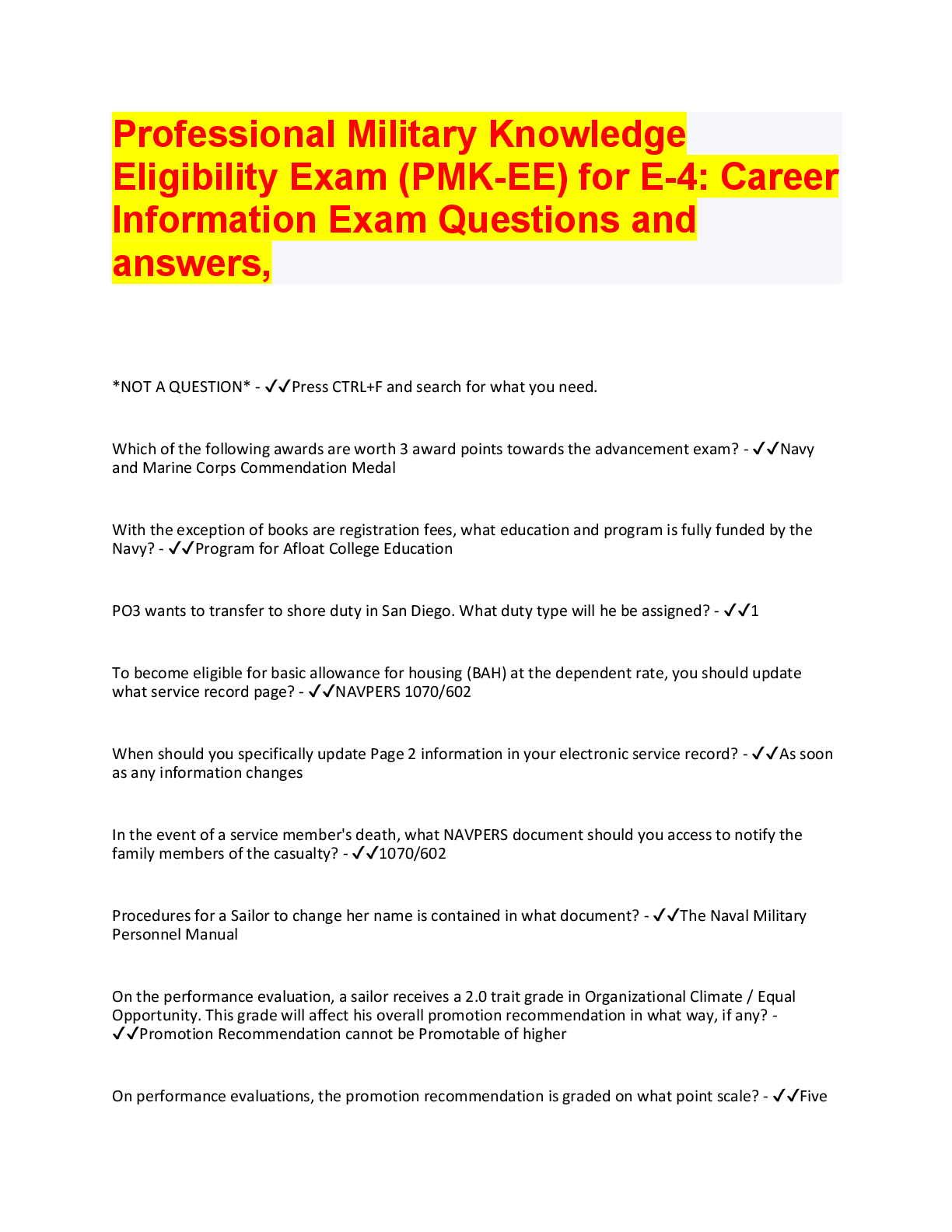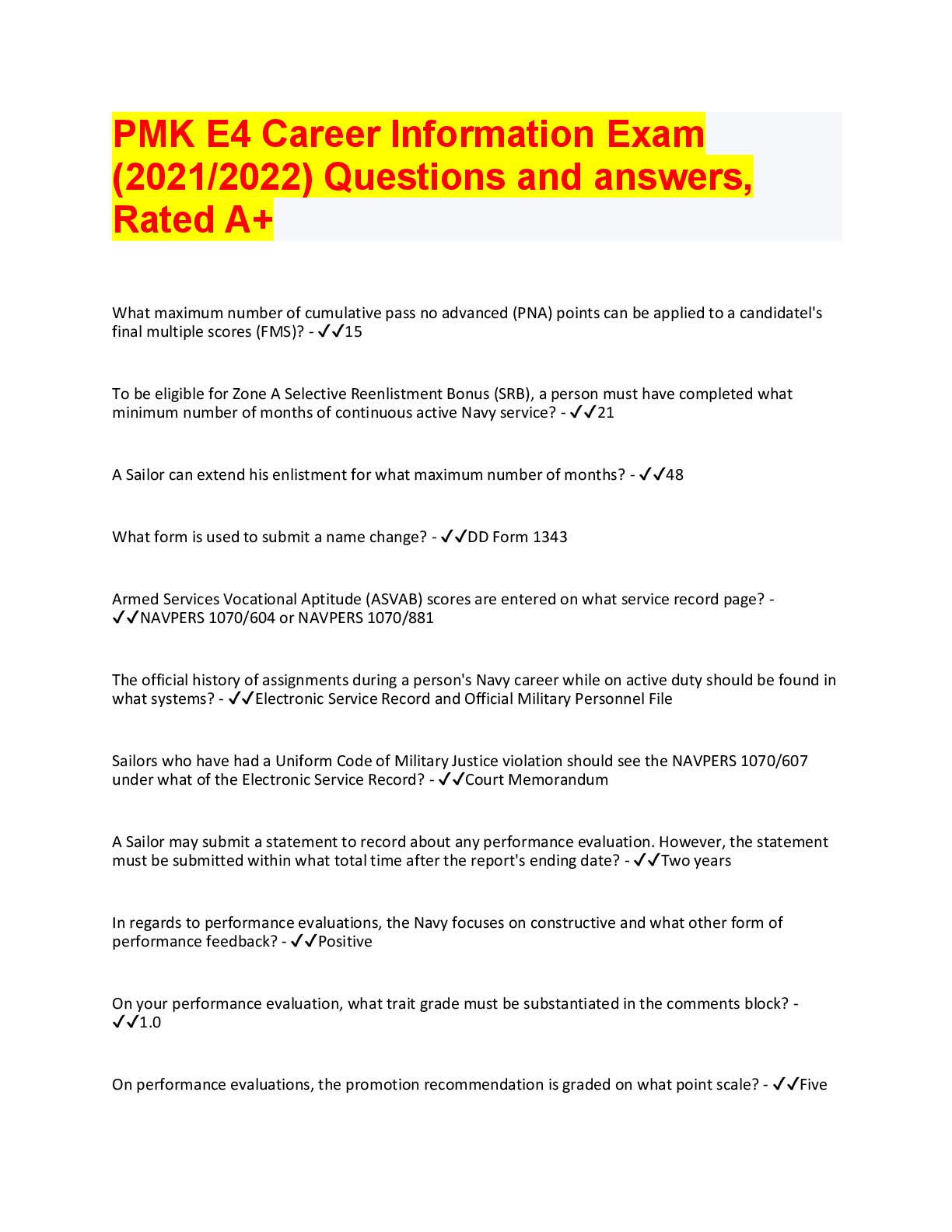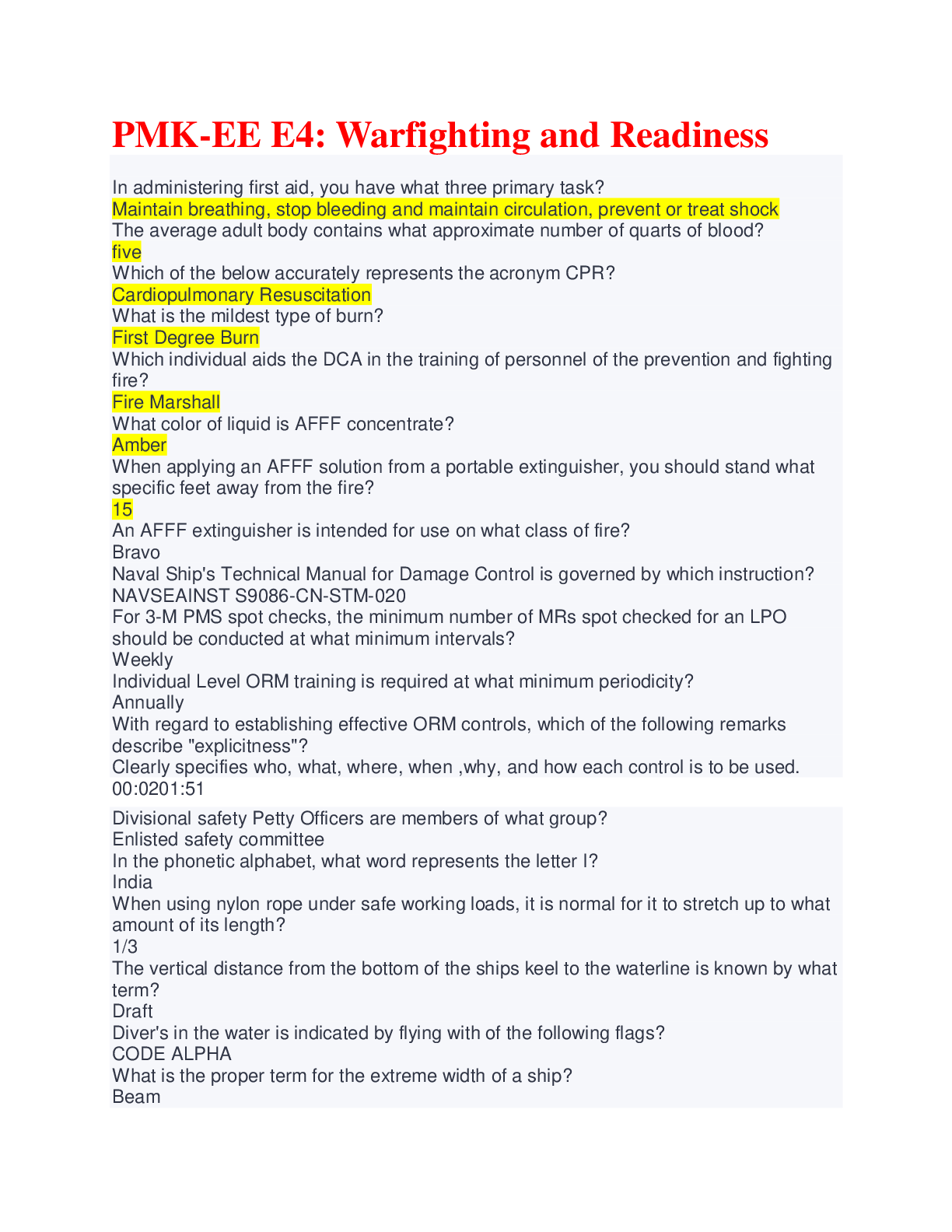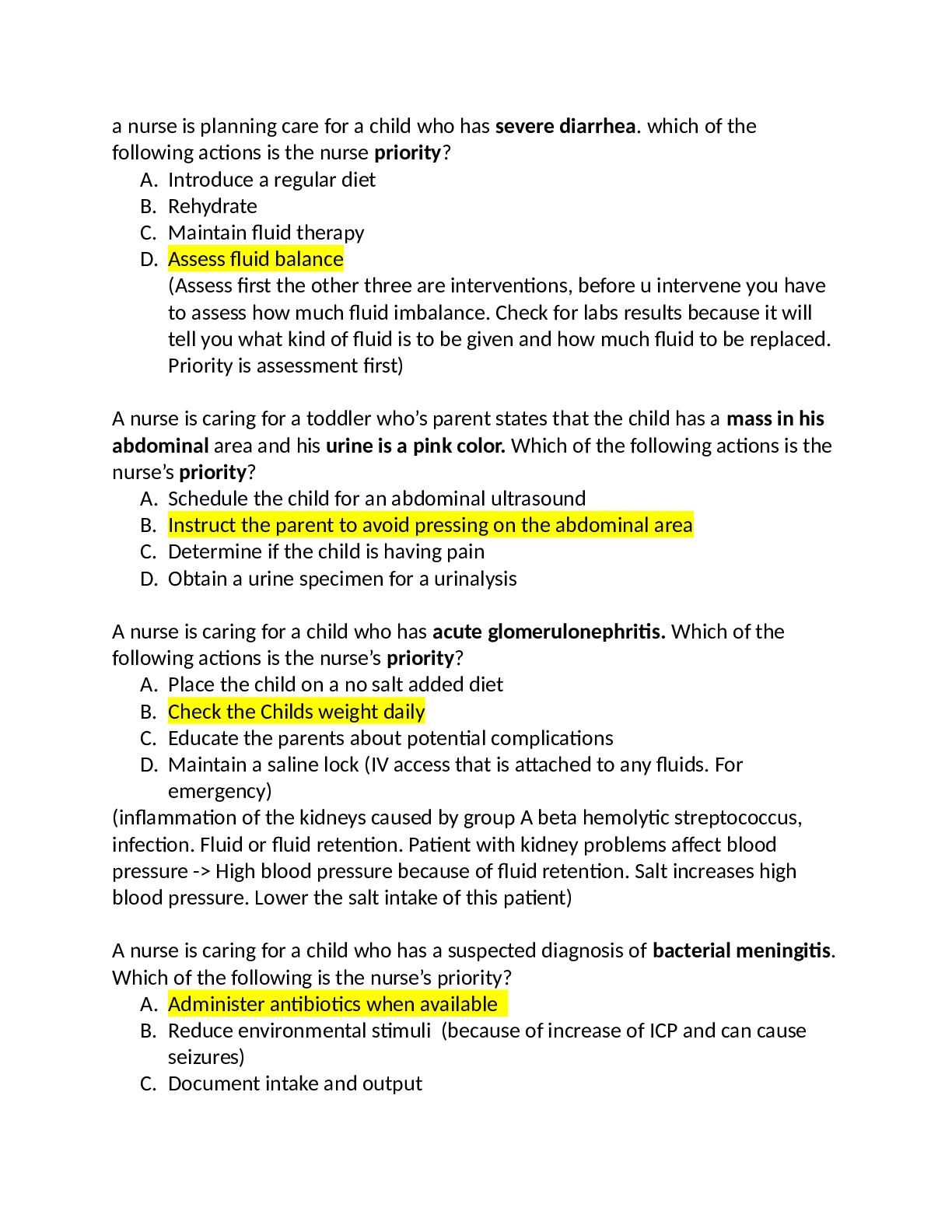Critical Thinking > QUESTIONS & ANSWERS > Critical Thinking and Logic - C168 Questions and Answers with complete solutions (All)
Critical Thinking and Logic - C168 Questions and Answers with complete solutions
Document Content and Description Below
Critical Thinking and Logic - C168 Questions and Answers with complete solutions What is critical thinking? Correct Answer- An intellectual model for understanding issues and forming reasonable an... d informed views on them. Involves analyzing, evaluating, and improving one's own thinking Thinking about thinking in order to make thinking better Critical thinking comprises three interlinking dimensions Correct Answer- 1. Analyzing one's own thinking- breaking it down into its component parts. 2. Evaluating one's own thinking- identifying its weaknesses while recognizing its strengths. 3. Improving one's own thinking- reconstructing it to make it better. What are two barriers native to everyone? Correct Answer- egocentrism & sociocentrism What is egocentrism? Correct Answer- The tendency to view everything in relationship to oneself An innate human trait Rigidity of thought What is sociocentrism? Correct Answer- The assumption that one's own social group is inherently superior to all othersWhat is first-order thinking? Correct Answer- Ordinary Thinking 1. Spontaneous and non-reflective 2. Contains insight, prejudice, good and bad reasoning 3. Indiscriminately combined What is second-order thinking? Correct Answer- Critical Thinking First-order thinking that is consciously realized (i.e., analyzed, assessed, and reconstructed) What is weak-sense critical thinking? Correct Answer- Thinkers ignore the flaws in their own thinking and often seek to win an argument through intellectual trickery and deceit What is strong-sense critical thinking? Correct Answer- Thinkers strive to be ethical and empathize with others' viewpoints. They will entertain arguments with which they do not agree and change their views when confronted with superior reasoning What are the defining traits of critical thinkers? Correct Answer- 1. Intellectual Humility 2. Intellectual Courage 3. intellectual Empathy 4. Intellectual Integrity 5. Intellectual Perseverance 6. Confidence in Reasoning 7. Intellectual Autonomy Characterization of Intellectual Humility Correct Answer- Aware of the limitations of one's viewpoint Characterization of Intellectual Courage Correct Answer- Confronting ideas, viewpoints, or beliefs with fairness, even when doing so is painfulCharacterization of Intellectual Empathy Correct Answer- Inhabiting the perspectives of others in order to genuinely understand them Characterization of Intellectual Integrity Correct Answer- Holding oneself to the same rigorous intellectual standards that one expects others to meet Characterization of Intellectual Perseverance Correct Answer- Not giving up when confronted by complicated problems that don't lend themselves to easy solutions Characterization of Confidence in Reasoning Correct Answer- Encourages people to arrive at their own conclusions through their own powers of rational thinking Characterization of Intellectual Autonomy Correct Answer- Thinking for oneself while adhering to standards of rationality What are some ways to improve your thinking? Correct Answer- 1. Use 'wasted' time 2. Handle one problem per day 3. Internalize intellectual standards 4. Keep an intellectual journal 5. Practice intellectual strategies 6. Reshape your character 7. Deal with your ego 8. Redefine the way you see things 9. Get in touch with your emotions 10. Analyze group influences on your life Three functions of the Mind Correct Answer- 1. Thinking - Makes sense of the world ex. judging, analyzing 2. Feeling - Tells us how we are doing ex. happy, sad3. Wanting - Drives us to act as we do ex. goals, desires Define Sophistry Correct Answer- The ability to win an argument regardless of flaws in the reasoning Elements of Reasoning Correct Answer- 1. Purposes 2. Information 3. Questions 4. Concepts 5. Assumptions 6. Inferences 7. Implications 8. Points of View The nine fundamental intellectual standards Correct Answer- 1. Clarity 2. Accuracy 3. Precision 4. Relevance 5. Depth 6. Breadth 7. Logic 8. Significance 9. Fairness The elements of reasoning are also known as Correct Answer- Parts of thinking and Fundamental structures of thought Reasoning Correct Answer- The mind drawing conclusions on the basis of reasonsPurpose Correct Answer- The goal or desired outcome of our reasoning Assumption Correct Answer- Something we take for granted as true in our reasoning Implications Correct Answer- Said to follow from our reasoning Theories are examples of: Correct Answer- Concepts In reasoning, we make __________ based on ___________. Correct AnswerInferences/assumptions Distinctions between the elements of reasoning are_______ not ________. Correct AnswerRelative/Absolute Which of the following best describes activated ignorance? Correct Answer- Mentally taking in and actively using false information In some cases, the conclusions we draw are based on assumptions that operate at an ________ level. Correct Answer- Unconscious What are the three kinds of implications that may be involved in any situation? Correct AnswerPossible, probable, necessary Clarity Correct Answer- Thinking that is easily understood Precise Correct Answer- Reasoning that is specific, exact and sufficiently detailed Mind receives information in three distinct forms: Correct Answer- 1. Inert information2. Activated ignorance 3. Activated knowledge Three types of questions Correct Answer- 1. Questions of Fact 2. Questions of Preference 3. Questions of Judgement Questions of Fact Correct Answer- Only one corre [Show More]
Last updated: 2 years ago
Preview 1 out of 16 pages

Buy this document to get the full access instantly
Instant Download Access after purchase
Buy NowInstant download
We Accept:

Reviews( 0 )
$8.00
Can't find what you want? Try our AI powered Search
Document information
Connected school, study & course
About the document
Uploaded On
Sep 14, 2022
Number of pages
16
Written in
Seller

Reviews Received
Additional information
This document has been written for:
Uploaded
Sep 14, 2022
Downloads
0
Views
127
















 COMPREHENSIVE PREDICTOR ATI 1ST TAKE Questions and Answers with Complete Solutions.png)








